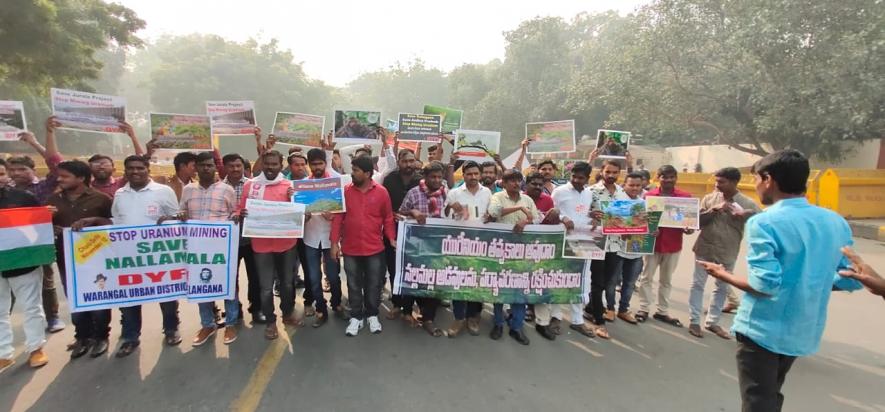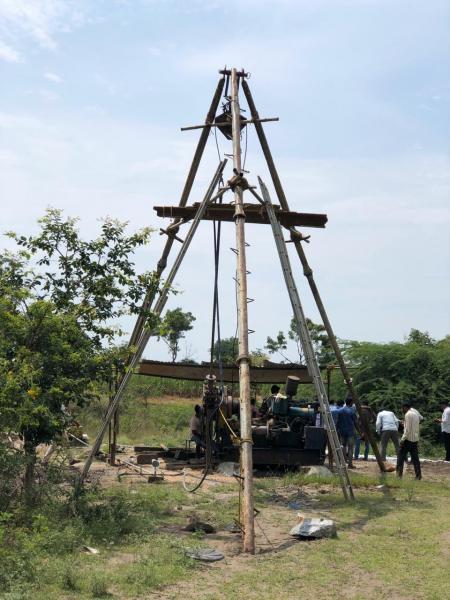Adivasis, Wildlife and Ecosystem Under Threat of Uranium Mining in Nallamalla Forest

Demanding immediate withdrawal of Uranium survey and mining in Nallamalla forest, members of Democratic Youth Federation of India (DYFI) from Telugu-speaking states led a protest rally on Parliament street in the national capital on November 12. They argue that the proposed uranium excavation in Andhra Pradesh and Telangana would not only be a threat to Adivasis and wildlife present there, but would have disastrous effects on the air, rivers, groundwater and the entire ecosystem.
Addressing the protest in Delhi, Viplav, DYFI Telangana president said that the lives of over 38,000 people, including the indigenous Chenchu tribe, are under severe threat if Uranium mining is conducted in the forest and demanded the central government to immediately withdraw its plans to excavate Uranium mineral from Nallamalla.
“In the name of uranium survey, the Uranium Corporation of India Limited (UCIL) has drilled over 4,000 boreholes in the forest area,” said Viplav. He fears that Krishna river will get polluted if the mining begins, which is the main source of drinking water for the residents of three states’ capital cities – Hyderabad (Telangana), Amaravathi (Andhra Pradesh) and Chennai (Tamil Nadu).
Also read: Uranium Mining Set to Destroy India’s 2nd Largest Tiger Reserve
The rally was followed by a protest meeting which was attended by All India Democratic Women's Association (AIDWA) president Subhashini Ali and Communist Party of India (Marxist) [CPI(M)] leader Punyavathi among others.
Student organisations, Left parties and tribal organisations from both the states have been protesting in various forms since the Uranium survey began in July this year.
Reportedly, the Ministry of Environment, Forest and Climate Change (MoEFCC) has recommended “in-principle approval” for a proposal by the Department of Atomic Energy (DAE) for survey and exploration of uranium over 83 square kilometres in Amrabad Tiger Reserve in Telangana. Subsequently, on June 19, MoEFCC's Deputy Inspector General of Forests Naresh Kumar wrote to Telangana government requesting it to “submit the proposal along-with verified relevant documents” for identified boreholes for further consideration by the ministry. According to local reports, the UCIL began digging boreholes from July this year.
As the survey began, numerous campaigns by political parties and environmentalists have demanded the government to stop uranium excavation and save Nallamalla.
Under pressure, Telangana state Assembly on September 16, passed an unanimous resolution, urging the central government to stop uranium mining activities in Nallamalla forest in the state.
However, the UCIL continued its survey, said Viplav. “On October 6, DYFI members in Mastipur village of Atmakur mandal in undivided Mahaboobnagar district stopped the UCIL officials from digging borewell there,” he told NewsClick.

In 1983, Nallamalla forest is categorised as Tiger Reserve forest. According to latest government estimates, the forest has 74 tigers and 80 leopards among other wildlife.
According to the Integrated Tribal Develoment Agency data in 2015, there are 10,671 families comprising of 41,780 people belonging to Chenchu adivasi community, who are living in six districts across Nallamalla forest. These districts include undivided Mahaboobnagar, Nalgonda and Rangareddy in Telangana, and Guntur, Prakasam and Kurnool in Andhra Pradesh.
Get the latest reports & analysis with people's perspective on Protests, movements & deep analytical videos, discussions of the current affairs in your Telegram app. Subscribe to NewsClick's Telegram channel & get Real-Time updates on stories, as they get published on our website.
























